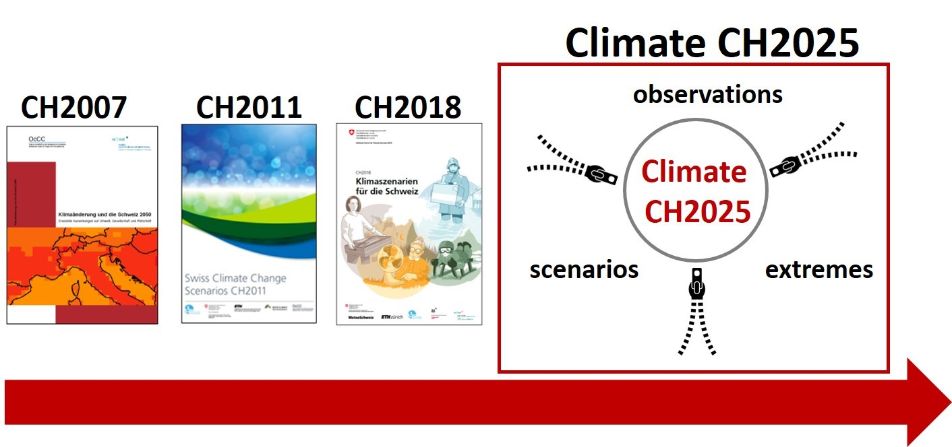Work on national climate scenarios for Switzerland first began in the early 2000s, culminating in the 2007 report «Climate Change and Switzerland 2050». Since 2014, the Federal Office of Meteorology and Climatology (MeteoSwiss) has been tasked with producing regular up-to-date climate scenarios according to the latest scientific findings. The most recent scenarios are based on the 2018 edition («CH2018») and are currently being revised («Climate CH2025»).

There have been published three editions of national climate scenarios to date and the next edition is already being developed:
Climate scenarios CH2007
The report «Climate Change and Switzerland 2050» was produced in 2007 under the aegis of the Advisory Body on Climate Change (OcCC) and the Forum for Climate and Global Change (ProClim). The report is built on MeteoSwiss' projections of future temperature and precipitation trends in the form of climate scenarios. These scenarios are scientifically based on the Third and Fourth Assessment Reports of the Intergovernmental Panel on Climate Change (IPCC) and served as a basis for the description of the impacts of climate change in Switzerland up to the middle of this century.
Report:
- CH2007 - Report (PDF, 9 MB, 04.10.2023)Climate Change and Switzerland 2050 - Expected Impacts on Environment, Society and Economy
Climate scenarios CH2011
The CH2011 Climate Scenarios were created under the aegis of ETH Zurich and MeteoSwiss. Compared with the 2007 report, these scenarios featured improved projections of regional and global climate models and new statistical methods. This provides for enhanced and more robust information on future climate trends in Switzerland, comprising localised data, including assessments of uncertainties and with a significantly broader product range. The CH2011 scenarios are based on the results of the IPCC's Fourth Assessment Report and the climate simulations of the European ENSEMBLES project.
The follow-up extension series (CH2011+) complements the CH2011 Climate Scenario products to better meet users' needs. The extensions consist of several articles (in English) and corresponding datasets and were coordinated by members of the CH2011 community.
Reports and data
- CH2011 - Summary (PDF, 8 MB, 01.01.2011)
- CH2011 - Full report (medium resolution) (PDF, 16 MB, 05.10.2023)
- CH2011 Extension No. 1 (PDF, 2 MB, 01.01.2015)Local scenarios at daily resolution for emission scenarios A2 and RCP3PD
Bosshard et al. (2015) - CH2011 Extension No. 2 (PDF, 4 MB, 01.01.2015)Climate scenarios of seasonal means: extensions in time and space
Fischer et al. (2015) - CH2011 Extension No. 3 (PDF, 1 MB, 01.01.2016)Climate scenarios of seasonal means: inter-variable and inter-seasonal correlations of change estimates
Fischer et al. (2016) - CH2011 Extension No. 4 (PDF, 1 MB, 01.01.2017)Bias-corrected transient scenarios at the local scale and at daily resolution
Kotlarski et al. (2017)
Climate scenarios CH2018
Like previous editions, the CH2018 Climate Scenarios were developed under the aegis of MeteoSwiss and ETH Zurich under the umbrella of the National Centre for Climate Services (NCCS) in collaboration with other partners. They validate and build upon the projections of future climate change in Switzerland set out in the previous scenario generations and are based on the Fifth Assessment Report of the IPCC. Compared with CH2011, CH2018 also provides concrete values for various trends that had previously only been known qualitatively, such as drought, extreme precipitation or heat indicators. Once again, the latest generation of climate model simulations were used in combination with new statistical methods. The CH2018 Scenarios also incorporated another key innovation, namely the processing of the results into user-oriented products such as a brochure, a web atlas and specific datasets.
Reports and data
Climate scenarios Climate CH2025
The «Climate CH2025» project was launched in early 2023 with a view to aligning the current climate scenarios with the latest scientific findings and addressing additional user requirements. The project aims to develop, update and make available the physical bases of climate change in Switzerland. Publication of the results is scheduled for late 2025.
Further information:
Last modification 26.06.2024





